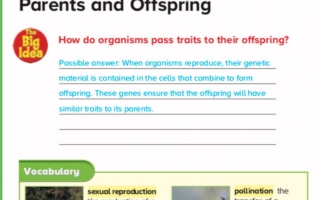CHAPTER 2
Parents and Offspring
How do organisms pass traits to their offspring?
Possible answer: When organisms reproduce, their genetic material is contained in the cells that combine to form offspring. These genes ensure that the offspring will have similar traits to its parents.
Vocabulary
sexual reproduction
the production of a new organism from a female sex cell and a male sex cell
asexual reproduction
the production of a new organism from only one cell
vegetative propagation
asexual reproduction in plants that produces new plants from leaves, roots, or stems
pollination
the transfer of a pollen grain to the egg-producing part of a plant
metamorphosis
a series of distinct growth stages that are different from one another
heredity
the passing down of inherited traits from one generation to the rext
Parents and Offspring
What We Know
All living things reproduce.
Most plants grow from seeds.
Animals grow and develop during their Life cycle.
What We Want to Know
How do living things reproduce?
How do plants reproduce without seeds?
What We Learned
Reproduction can be sexual or asexual.
Mosses use spores to reproduce.
Butterflies and moths go through complete metamorphosis.
Lesson 1 Reproduction
Lesson 1 Reproduction
Objectives
Explain sexual and asexual reproduction.
Compare and contrast sexual and asexual reproduction.
1 Introduce
Assess Prior Knowledge
Ask students to describe how plants and animals reproduce. Write their responses on the board.
Possible answers: Animal parents give birth to small animals. Some plants grow from seeds. Ask:
How do plants produce new plants? Possible answers: Some plants grow from seeds. Some plants grow from other parts of plants.
How do animal parents produce new animals? Accept all reasonable answers about sexual reproduction in animals.
Look and Wonder
Each little plant is an identical copy of the kalanchoe plant it is growing on. How did these plants grow without seeds or spores?
Possible answer: Maybe the plants grew from a part of the original plant The new plants are a kind of offshoot that has the same traits as the parent.
Essential Question
How do living things reproduce?
Possible answer: Living things reproduce by combining cells from a male and female to form a new organism. They can also reproduce by dividing their own individual cells or growing new versions of themselves on their own.
Explore
Materials
• philodendron plant
• safety scissors
• hand lens
• plastic cup
• water
• 2week-old cutting in o plastic cup (optional)
Can some flowering plants grow without seeds?
Make a Prediction
You have leamed that flowering plants use seeds to reproduce. Can some flowering plants reproduce without seeds? Can you use part of a plant to create a new plant? Make a prediction.
Possible prediction: A stem placed in water can grow into a new plant.
Test Your Prediction
1 Cut piece of stem from the philodendron plant that measures 15 centimeters in length. Cut off the leaves that are closest to the plant. Leave two leaves at the very tip of the cutting.
2 Observe Look at your cutting with the hand lens. Record your observations.
Possible answer: The stem has no roots, but has bumps along the stem where the leaves grew.
3 Fill the plastic cup of the way with water. Place the cutting into the plastic cup.
4 Interpret Data Examine your cutting each day with the hand lens. Record your observations and any changes.
Answers will vary. Students should observe long, hair-like roots growing from the stem.
Inquiry Activity
Draw Conclusions
5 Infer What happened to the cutting in the plastic cup with water?
Answers will vary. Possible answer: Roots began sprouting from the cutting.
6 Is it possible to grow a new plant without planting a seed? Explain.
Yes, a new plant began growing from the stem of the plant. It did not need a seed to grow.
Explore More
Could other plants grow in a way that is similar to the philodendron plant? Plan an investigation to answer the question. Write a report of your results and present it to the class.
Answers will vary.
Open Inquiry
Do you think other parts of a plant could grow into another plant? Why or why not?
Possible answer: Yes, I think other parts could sprout a new plant because they all contain the genetic material of the plant and all have the potential to grow.





